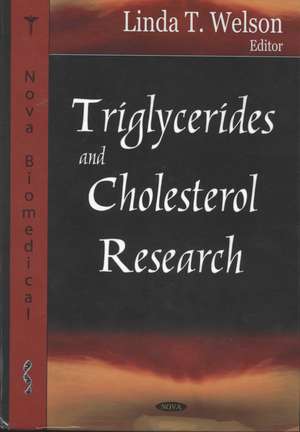Triglycerides and Cholesterol Research
Autor Linda T. Welsonen Limba Engleză Hardback – 14 noi 2006
Preț: 1282.89 lei
Preț vechi: 1755.69 lei
-27% Nou
Puncte Express: 1924
Preț estimativ în valută:
245.48€ • 267.49$ • 206.85£
245.48€ • 267.49$ • 206.85£
Carte indisponibilă temporar
Doresc să fiu notificat când acest titlu va fi disponibil:
Se trimite...
Preluare comenzi: 021 569.72.76
Specificații
ISBN-13: 9781600211096
ISBN-10: 1600211097
Pagini: 283
Ilustrații: tables & charts
Dimensiuni: 186 x 265 x 24 mm
Greutate: 0.8 kg
Editura: Nova Science Publishers Inc
ISBN-10: 1600211097
Pagini: 283
Ilustrații: tables & charts
Dimensiuni: 186 x 265 x 24 mm
Greutate: 0.8 kg
Editura: Nova Science Publishers Inc
Cuprins
Preface; High-Density Lipoproteins and Coronary Heart Disease HDLs: A Heterogeneous and Multi-Functional Lipoprotein Class; Bad HDL-C Responders to Statins; LDL Oxidation: The Effect of Phytochemicals and Food Ingredients; Modulation of Triglyceride Synthesis in 3T3-L1 Adipocytes by Medium Chain Fatty Acids: Involvement of Reactive Oxygen Species; Identification and Quantification of the Molecular Species of [14C] Acylglycerols Incorporating Various [14C] Fatty Acids in Plant Microsomes and Non-Labelled Acylglycerols in Castor Oil by HPLC; Bacterial Triacylglycerols; The Decreased Incidence of Ischemia-Reperfusion Induced Ventricular Arrhythmias and the Hypolipidemic Effect of the new ACAT Inhibitor, VULM 1457, in the Diabetic-Hypercholesterolemic Rats; Effects of Medium-Chain Triacylglycerols on Energy Functions in Premature Infants; The Role of Cholesterol in Beta-Amyloid Production in Alzheimer's Disease; 13C Nuclear Magnetic Resonance Studies of Mono-, Di- and Tri-Acylglycerols: NOE Factors and Spin-Lattice Relaxation of Acyl Chain Carboxy Carbons; Index.
